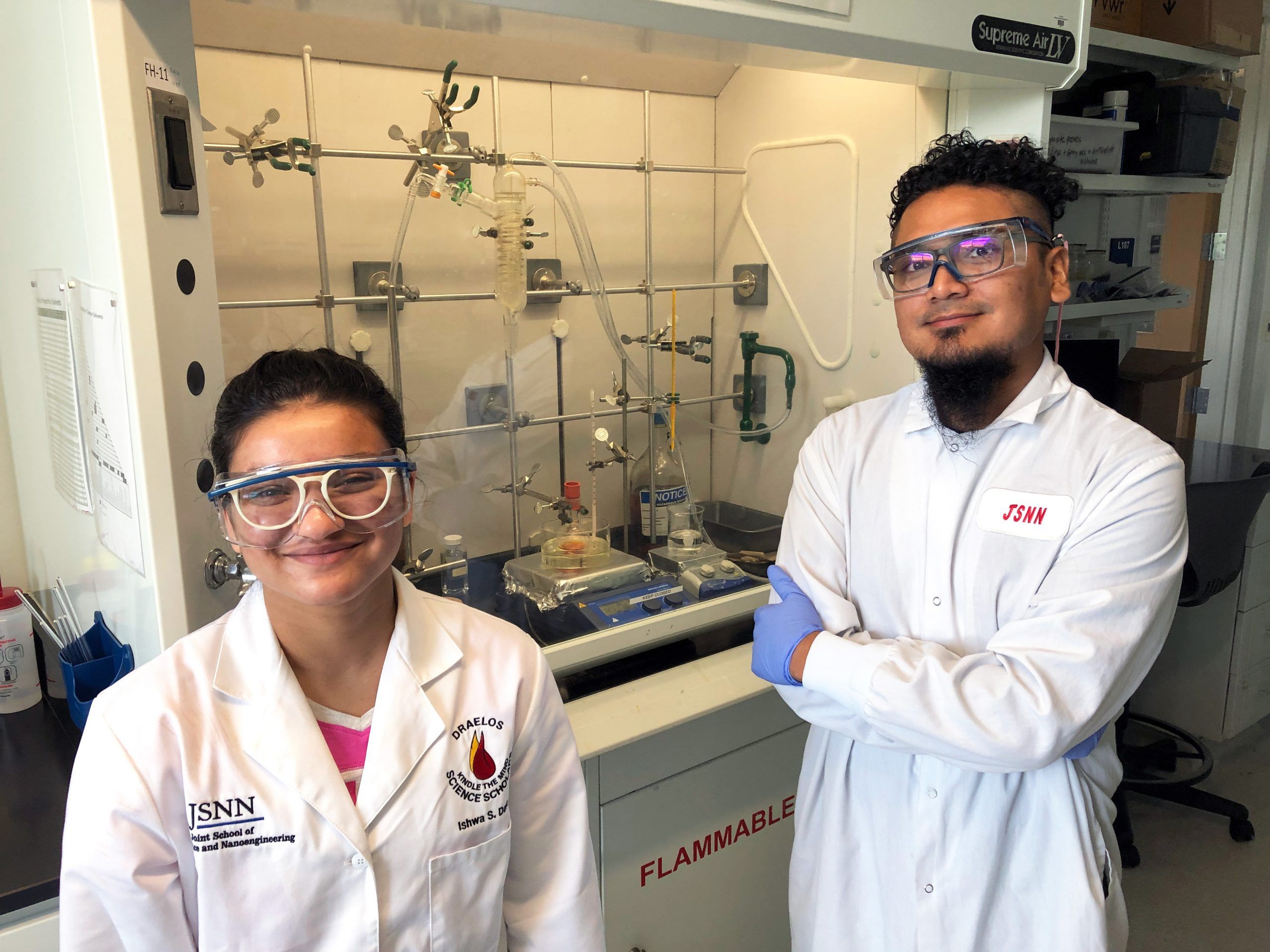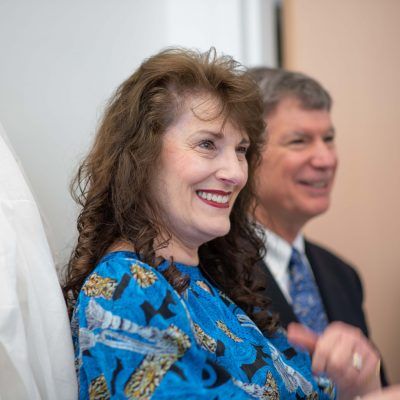NURTURING STEM’S NEXT GENERATION
Local physicians collaborate with UNCG & JSNN to inspire high school students
NURTURING STEM’S NEXT GENERATION
Most high school students spend their summers playing video games, earning spending money at summer jobs or, perhaps, taking an extra class or two to bolster their chances of getting into college.
Not Southwest Guilford High School’s Ishwa Dave.
“This summer I helped synthesize potential new drugs, using silver compounds with caffeine that have potential anti-cancer properties,” she says. Dave, who hopes to one day go to medical school and become a pediatric oncologist, worked in Dr. Daniel Rabinovich’s lab at the UNCG and NC A&T Joint School of Nanoscience and Nanoengineering.
She was one of 17 high school students who spent the summer doing research as Draelos Science Scholars. The goal of the program is to inspire future scientists and engineers to pursue STEM careers.
It’s rooted in Dr. Zoe Draelos’ own experience.
When Zoe Draelos was in high school, she spent a summer at a nature preserve studying how herbicides had caused mutations in microorganisms living in a lake. She had the opportunity thanks to a National Science Foundation initiative aimed at getting students interested in research.
Reflecting UNCG’s commitment to regional transformation, the Draelos Science Scholars program gives promising local high school students opportunities to take part in university research.
Reflecting UNCG’s commitment to regional transformation, the Draelos Science Scholars program gives promising local high school students opportunities to take part in university research.
High school students Fully Porter & Nicholas Alejandro load samples into a nuclear magnetic resonance spectrometer in the photo above.
High school students Fully Porter & Nicholas Alejandro load samples into a nuclear magnetic resonance spectrometer in the photo above.
“That really changed my life,” she says. “When I came back from that, I decided I was going to go into a STEM area.”
She went to medical school, eventually becoming a dermatologist and building a dual-track career as a clinician and researcher.
Her success is not an outlier. “We know students who participate in a research experience, whether in high school or college, have better educational outcomes,” says Dr. Terri L. Shelton, vice chancellor for research and engagement at UNCG.
That’s why Zoe and her husband Michael – a gastroenterologist and fellow science enthusiast – launched the Draelos Scholars program seven years ago.
For six weeks each summer, promising Triad-area high school juniors have the opportunity to don white coats and work in university research labs at UNCG, the Joint School of Nanoscience and Nanotechnology, and other area universities.
More than 100 students have been through the program, which grows each year.
Lifelong learner
Dr. Michael Draelos recently added a UNCG master of science in informatics and analytics to his list of credentials.

This summer, Ishwa Dave worked with JSNN nanoscience PhD student Moisés Zelada-Bazán in Dr. Daniel Rabinovich’s lab.
Photo courtesy of Daniel Rabinovich
This summer, Ishwa Dave worked with JSNN nanoscience PhD student Moisés Zelada-Bazán in Dr. Daniel Rabinovich’s lab.
Photo courtesy of Daniel Rabinovich
From students to researchers
At the beginning of the program, the scholars participate in a white coat ceremony – similar to what aspiring physicians go through as they transition to the clinical study of medicine. “The goal is that the white coat symbolizes a level of maturity and performance to them, that’s the best that they can deliver,” says Zoe Draelos.
In Dr. Shabnam Hematian’s chemistry lab, Draelos Scholars are assisting graduate students and postdocs with National Science Foundation-funded experiments.
In Dr. Jasmine DeJesus’ child development lab, Draelos Scholars are helping communicate research findings to a broader audience and working with children and families at places such as the Greensboro Children’s Museum.
Both UNCG professors – among 12 faculty mentors for this year’s cohort – have had Draelos Scholars come back and work with them as undergraduate students.
DeJesus says the Draelos Scholars and their fresh perspectives energize her. “They renew my own enthusiasm for the work that we’re doing,” she says. “I encourage students to stay in touch, let me know how things turn out.”
“We support them, write recommendation letters for college – it’s been a great experience,” adds Hematian.
Aidan Hunt – now a third-year student majoring in computer science and linguistics at UNC-Chapel Hill – was a Draelos Scholar in Hematian’s lab in 2019. The experience, he says, gave him an inside look at the life of a scientist.
“I learned more about what it meant to be doing research at that level,” he says. “What it meant to actually choose research as a career, what the grad students and professors in the lab were doing, what their days look like.”
He talked about his Draelos Scholars experience in his college essays and admissions interviews, he says, and it’s even come up in a recent interview for a summer internship.
For Dave, in this years’ cohort, the work helping synthesize potential new cancer drugs has reinforced her interest in pursuing medicine. She can see herself as a doctor running human trials for potential cancer treatments – “helping research get to its final step,” she says.

Giving Back
The Draelos’ made sure their two sons had research opportunities in high school, but they knew many high school students don’t have the advantages their sons did.
“We’ve been very fortunate. I’ve received lots of wonderful opportunities,” Dr. Zoe Draelos says. “Now I have the resources to give them back.”

Giving Back
The Draelos’ made sure their two sons had research opportunities in high school, but they knew many high school students don’t have the advantages their sons did.
“We’ve been very fortunate. I’ve received lots of wonderful opportunities,” Dr. Zoe Draelos says. “Now I have the resources to give them back.”
Generational Impact
“The Draelos Scholars program is one of many ways UNCG is redefining what it means to be a public research university,” says Shelton. “We are focused on knowledge, student, and regional transformation.” An important part of that, she adds, is preparing students for the workforce.
The Draeloses hope their initiative might be duplicated in more places, to strengthen America’s STEM pipeline. “The whole point of this is to increase the participation of American high school kids in the scientific process,” Michael Draelos says.
The Draeloses’ ability to take their own experiences and transfer those lessons to students is what makes them so effective as philanthropists, says Paul Lessard, president of the High Point Community Foundation, which manages the fund that supports the Draelos Scholars program.
“I think that what Mike and Zoe are showing here is that everyone can be a philanthropist,” Lessard says. “I respect the fact that they’ve taken their passion and they’ve turned it into something remarkable that will impact, literally, generations of kids.”
Story by Mark Tosczak
Lead Photography by Bert Vanderveen
This article will appear in print in Spring 2023
- Office of Research & Engagement
- UNC Greensboro
- 1601 MHRA Building
- 1111 Spring Garden Street
- Greensboro, NC 27412